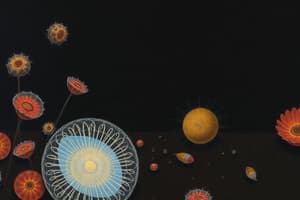Podcast
Questions and Answers
How do multicellular organisms grow?
How do multicellular organisms grow?
They grow by making more small cells, not by making their cells larger.
What are the three benefits of being multicellular?
What are the three benefits of being multicellular?
Longer size, longer life, and specialization.
What is a tissue?
What is a tissue?
A tissue is a group of cells that work together to perform a specific job.
What are four basic types of tissues in animals?
What are four basic types of tissues in animals?
What are three basic types of tissues in plants?
What are three basic types of tissues in plants?
What is the structure made up of two or more tissues working together called?
What is the structure made up of two or more tissues working together called?
A group of organs working together to perform a particular function is called a?
A group of organs working together to perform a particular function is called a?
What are examples of plant organs?
What are examples of plant organs?
Anything that can perform life processes is?
Anything that can perform life processes is?
The term for any organism with only one cell is?
The term for any organism with only one cell is?
Which of these is the lowest level of organization?
Which of these is the lowest level of organization?
Which of these is the highest level of organization?
Which of these is the highest level of organization?
An arrangement of parts in an organism is the?
An arrangement of parts in an organism is the?
The job the part does within the organism is the?
The job the part does within the organism is the?
The millions of tiny air sacs in the lungs are called?
The millions of tiny air sacs in the lungs are called?
Flashcards are hidden until you start studying
Study Notes
Multicellular Organisms
- Multicellular organisms grow by generating more small cells rather than enlarging existing cells.
- Benefits of being multicellular include increased size, extended lifespan, and the ability for cells to specialize in specific functions.
Tissues
- A tissue is defined as a collection of cells that collaborate to perform a specific task.
- In animals, there are four primary types of tissues:
- Nerve tissue
- Muscle tissue
- Connective tissue
- Protective tissue
Plant Tissues
- Plants consist of three fundamental tissue types:
- Transport tissue
- Protective tissue
- Ground tissue
Organs and Organ Systems
- An organ is a structure composed of two or more types of tissues working collaboratively.
- An organ system consists of a group of organs that work together to carry out a particular function.
Plant Organs
- Key examples of plant organs include:
- Leaf systems
- Root systems
- Stem systems
Life Processes and Organization
- Any entity capable of performing life processes is designated as an organism.
- Unicellular organisms are those that consist of a single cell.
- Cells represent the lowest level of biological organization, while organ systems constitute the highest level.
Structure and Function
- The arrangement of parts within an organism is referred to as its structure.
- The specific role of a part within an organism is known as its function.
Respiratory System
- The tiny air sacs in the lungs, crucial for gas exchange, are known as alveoli.
Studying That Suits You
Use AI to generate personalized quizzes and flashcards to suit your learning preferences.




